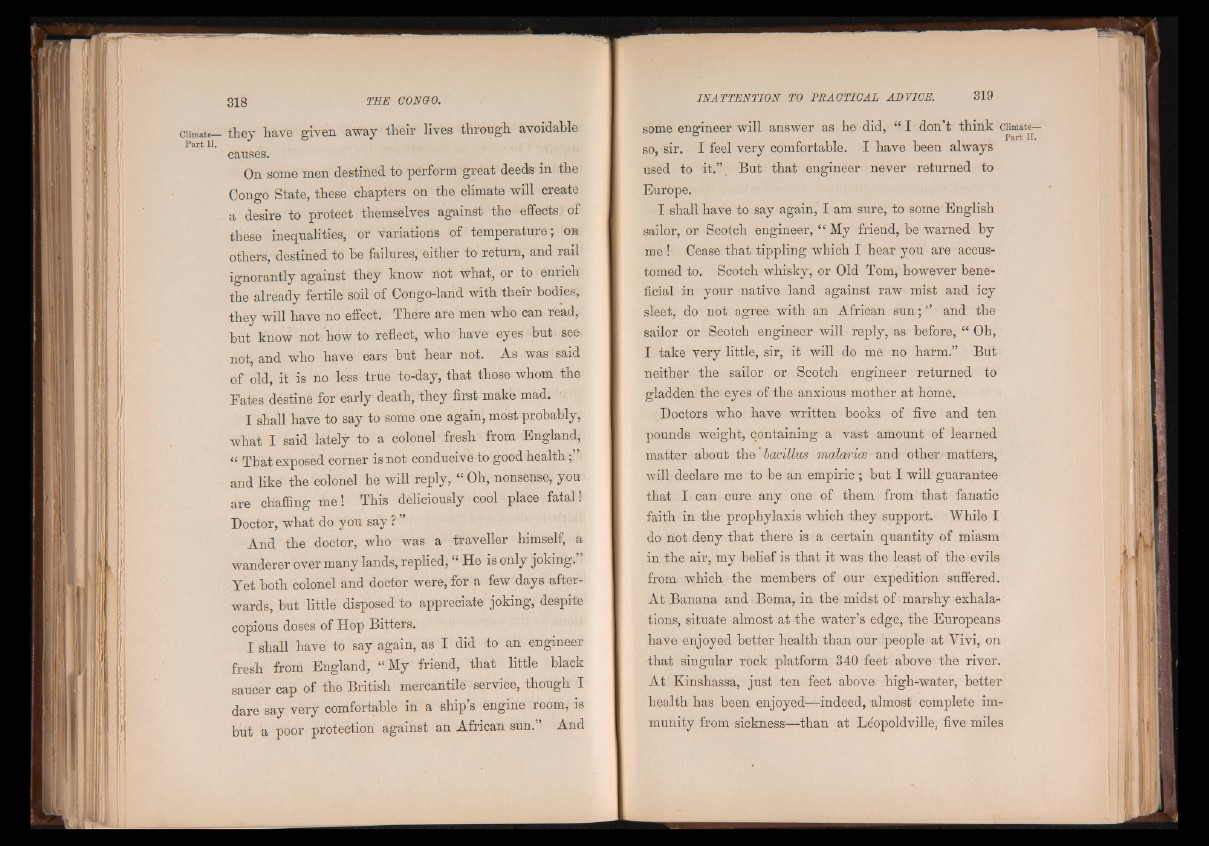
they have given away their lives through avoidable
causes.
On some men destined to perform great deeds in the
Congo State, these chapters on the climate will create
a desire to protect themselves against the effects, of
these inequalities, or variations of temperature, on
others, destined to be failures, either to return, and rail
ignorantly against they know not what, or to enrich
the already fertile soil of Congo-land with their bodies,
they will have no effect. There are men who can read,
but know not how to reflect, who have eyes but see
not, and who have ears but hear not. As was said
of old, it is no less true to-day, that those whom the
Fates destine for early death, they first make mad.
I shall have to say to some one again, most probably,
what I said lately to a colonel fresh from England,
“ That exposed corner is not conducive to good health
and like the colonel he will reply, “ Oh, nonsense, you
are chaffing me! This deliciously cool place fatal!
Doctor, what do you say ? R
And the doctor, who was a traveller himself, a
wanderer over many lands, replied, “ He is only joking.”
Yet both colonel and doctor were, for a few days afterwards,
but little disposed to appreciate joking, despite
copious doses of Hop Bitters.
I shall have to say again, as I did to an engineer
fresh from England, “ My friend, that little black
saucer cap of the British mercantile service, though I
dare say very comfortable in a ship’s engine room, is
but a poor protection against an African sun.” And
some engineer will answer as he did, “ I don’t think climate—
P a rt II.
so, sir. I feel very comfortable. I have been always
used to it.” . But that engineer never returned to
Europe.
I shall have to say again, I am sure, to some English
sailor, or Scotch engineer, “ My friend, be warned by
me ! Cease that tippling which I hear you are accustomed
to. Scotch whisky, or Old Tom, however beneficial
in your native land against raw mist and icy
sleet, do not agree with an African s u n ;” and the
sailor or Scotch engineer will reply, as before, “ Oh,
I take very little, sir, it will do me no harm.” But
neither the sailor or Scotch engineer returned to
gladden the eyes of the anxious mother at home.
Doctors who have written books of five and ten
pounds weight, containing a vast amount of learned
matter about th e ' bacillus malarice and other matters,
will declare me to be an empiric; but I will guarantee
that I can cure any one of them from that fanatic
faith in the prophylaxis which they support. While I
do not deny that there is a certain quantity of miasm
in the air, my belief is that it was the least of the evils
from which the members of our expedition suffered.
At Banana and Boma, in the midst of marshy exhalations,
situate almost at the water’s edge, the Europeans
have enjoyed better health than our people at Yivi, on
•that singular rock platform 340 feet above the river.
At Kinshassa, just ten feet above high-water, better
health has been enjoyed—indeed, almost complete immunity
from sickness—than at Leopoldville, five miles